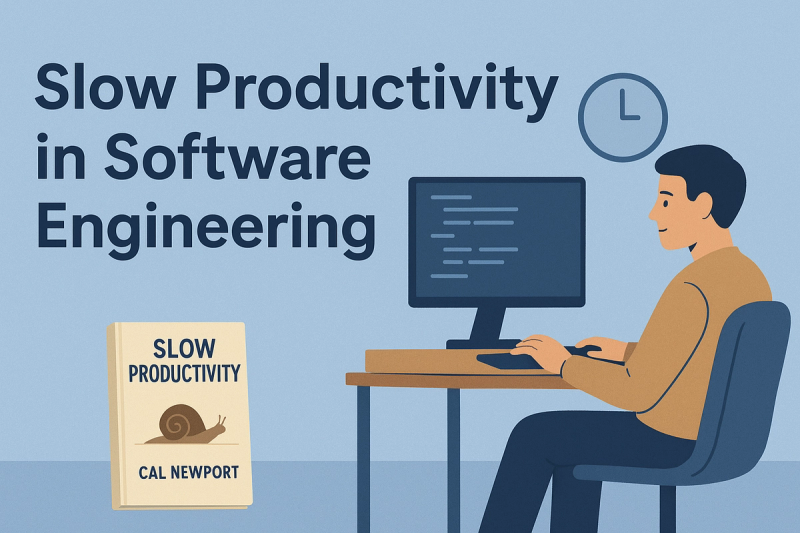September 10, 2025
Slow Productivity in Software Engineering: A Deeper Look

September 10, 2025

I recently picked up Cal Newport’s Slow Productivity: The Lost Art of Accomplishment Without Burnout, and honestly, it hit me right where I live as a software engineer. While the book is written for knowledge workers in general, so much of it felt like Newport had been sitting in on engineering stand-ups and late-night deploys.
His argument is simple but powerful: doing fewer things, working at a natural pace, and obsessing over quality aren’t just abstract principles—they’re survival skills in an industry that constantly demands “faster, faster, faster.” And the more I read, the more I found myself nodding along. Because I’ve seen it: teams burning out chasing impossible deadlines, features shipped half-baked, and the constant churn of fixing yesterday’s “quick win.”
So this article is my take on Newport’s three pillars of slow productivity, through the lens of software engineering. Because if there’s one profession where these ideas matter, it’s ours.
Every engineer has lived through the dreaded “plate-spinning” project cycle: juggling multiple half-finished features, bugs that keep resurfacing, and endless context switching. On paper, multitasking looks efficient. In practice, it’s a productivity sinkhole.
Focusing on fewer tasks isn’t about being lazy—it’s about being ruthless with priorities. Shipping one thoughtful, well-tested feature is more valuable than releasing three clunky ones that each generate tickets for the next six months.
Think about refactoring a legacy module. If you treat it as “just another ticket in the sprint,” it gets rushed, corner cases are ignored, and technical debt creeps back in. But if the team consciously decides, “This is the one engineering focus for the next two weeks,” the outcome is cleaner, faster, and ironically delivered sooner than if everyone was splitting their attention.
Less scattered effort means fewer loose ends, fewer late-night bug hunts, and more confidence in what actually gets shipped.
There’s a strange badge of honor in software: the 60-hour work week, the marathon bug bash, the weekend “just one more push.” But software isn’t a sprint, it’s a marathon with no finish line. Running at an unsustainable pace doesn’t make teams faster. It just makes them tired.
Working at a natural pace doesn’t mean slacking off. It means respecting the rhythms of real human focus. Engineers are not machines. A brain that’s been debugging concurrency issues for six straight hours is not the same brain that writes clear, maintainable code.
Ironically, pacing yourself often feels slower in the moment but faster over time. Think of test-driven development (TDD). Writing tests before code feels like a slowdown at first. But weeks later, when regressions show up, those tests save days of rework. That’s the essence of natural pacing in engineering: slowing down now to avoid chaos later.
And here’s the kicker. Teams that consistently work at a sane pace almost always outdeliver teams that live in “crunch mode.” They have fewer production fires, steadier morale, and less turnover. In other words, slow is smooth, and smooth is fast.
We’ve all been there: the quick hack to “just get it working.” Maybe it’s a hardcoded value, maybe it’s skipping input validation, maybe it’s ignoring that one edge case you know will blow up later. At the time, it feels clever. A month later, it’s a PagerDuty nightmare at 3 a.m.
Slow productivity flips that impulse on its head. Instead of optimizing for speed in the short term, you invest in durability. Quality isn’t a nice-to-have in software. It’s the foundation.
Obsessing over quality may feel obsessive in the moment. But it’s cheaper than cleaning up messes later. And honestly, shipping something you’re proud of just feels better.
The obvious objection: “But deadlines! Stakeholders want speed!” True. Business needs don’t disappear just because engineers want to slow down. But here’s the hidden truth: sustainable speed and shallow speed are not the same.
A team constantly firefighting, rushing, and cutting corners delivers less over time, even if it looks busy. A team that embraces fewer things, steady pacing, and real quality delivers more over the long run, and does it without burning out.
You know what? The real courage in engineering isn’t pushing for speed. It’s defending the space to work slow enough that your work actually matters.
Cal Newport’s Slow Productivity isn’t just self-help for knowledge workers. (And honestly, if it comes in a book, is it really self-help? That’s literally someone helping you.) It’s a framework that, when applied to software engineering, can reshape how we build, maintain, and ship code. Do fewer things, work at a natural pace, and obsess over quality. That’s not just philosophy. It’s pragmatic engineering.
And maybe, just maybe, slowing down is how we finally speed up.